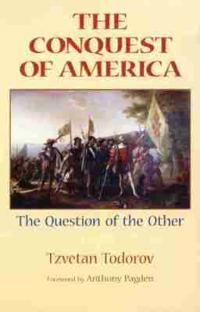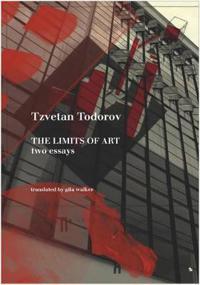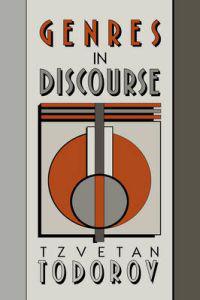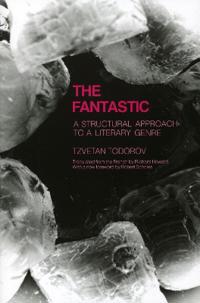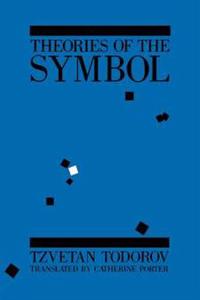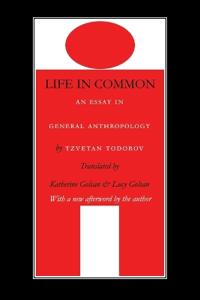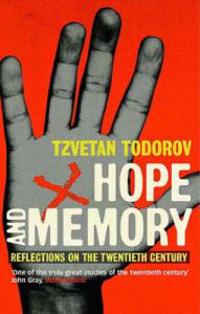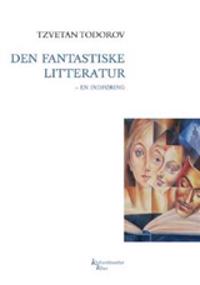Imperfect Garden (Pocket)
avTzvetan Todorov, Carol (TRN) Cosman, Tzvetan Todorov
ISBN: 9780691165936 - UTGIVEN: 2014-10Available in English for the first time, Imperfect Garden is both an approachable intellectual history and a bracing treatise on how we should understand and experience our lives. In it, one of France's most prominent intellectuals explores the foundations, limits, and possibilities of humanist thin[...]
Facing the Extreme (Pocket)
avTzvetan Todorov, Abigail Pollak, Tzvetan Todorov
ISBN: 9780805042641 - UTGIVEN: 199704The Conquest of America (Pocket)
avTzvetan Todorov, Richard Howard, Tzvetan Todorov
ISBN: 9780806131375 - UTGIVEN: 199903"The Conquest of America" is a fascinating study of cultural confrontation in the New World, with implications far beyond sixteenth-century America. The book offers an original interpretation of the Spaniards' conquest, colonization, and destruction of pre-Columbian cultures in Mexico and the Caribb[...]
The Limits of Art (Inbunden)
avTzvetan Todorov, Gila (TRN) Walker, Tzvetan Todorov
ISBN: 9781906497620 - UTGIVEN: 2010-12Tzvetan Todorov, one of Europe's leading intellectuals, explores the complex relations between art, politics, and ethics in the two essays that make up "The Limits of Art". In "Artists and Dictators," Todorov traces the intimate relationship between avant-garde art and radical politics in pre-revolu[...]
Genres in Discourse (Pocket)
avTzvetan Todorov
ISBN: 9780521349994 - UTGIVEN: 1990-10This is a collection in translation of recent essays by Tzvetan Todorov, one of the most eminent of today?s literary critics. The essays concentrate on the idea of genre, literary or otherwise, and ask such questions as: What is literature? What is genre? Which are the major literary genres? In the [...]
Hope and Memory: Lessons from the Twentieth Century (Övrig)
avTzvetan Todorov
ISBN: 9780691096582 - UTGIVEN: 2003-09-29Both a political history and a moral critique of the twentieth century, this is a personal and impassioned book from one of Europe's most outstanding intellectuals. Identifying totalitarianism as the major innovation of the twentieth century, Tzvetan Todorov examines the struggle between this system[...]
Fragility of Goodness, The: Why Bulgaria's Jews Survived the Holocaust (Övrig)
avTzvetan Todorov
ISBN: 9780691115641 - UTGIVEN: 2003-07-28With the exception of Denmark, Bulgaria was the only country allied with Nazi Germany that did not annihilate or turn over its Jewish population. Here, a prominent French intellectual with Bulgarian roots accounts for this singularity. Tzvetan Todorov assembles and interprets for the first time key [...]
The New World Disorder: Reflections of a European (Inbunden)
avTzvetan Todorov
ISBN: 9780745633688 - UTGIVEN: 2005-01-31The New World Disorder: Reflections of a European (Häftad)
avTzvetan Todorov
ISBN: 9780745633695 - UTGIVEN: 2005-01-31The Inner Enemies of Democracy (Häftad)
avTzvetan Todorov
ISBN: 9780745685748 - UTGIVEN: 2014-09-30Tzvetan Todorov is one of the leading intellectuals in France today. In this provocative new book he argues that the biggest threat to democracy today is not the supposed external enemies of Islamic fundamentalism and terrorism: rather, the biggest threat is internal to democracy itself: it's what t[...]
The Inner Enemies of Democracy (Häftad)
avTzvetan Todorov
ISBN: 9780745685755 - UTGIVEN: 2014-09-30The Fantastic: Piracy, Banditry, and Holy War in the Sixteenth-Century Adriatic (Häftad)
avTzvetan Todorov
ISBN: 9780801491467 - UTGIVEN: 197505This study of literature dealing with the fantastic or supernatural explores Northrop Frye's theory of genres and the work of such writers as Poe, Balzac, Nerval, Hoffman, and James[...]
Theories of the Symbol: Understanding Politics in an Unfamiliar Culture (Häftad)
avTzvetan Todorov
ISBN: 9780801492884 - UTGIVEN: 1984-09Focusing on theories of verbal symbolism, Tzvetan Todorov here presents a history of semiotics. From an account of the semiotic doctrines embodied in the works of classical rhetoric to an exploration of representative modern concepts of the symbol found in ethnology, psychoanalysis, linguistics, and[...]
Life in Common (Pocket)
avTzvetan Todorov, Katherine (TRN) Golsan, Lucy (TRN) Golsan
ISBN: 9780803294448 - UTGIVEN: 2001-03In Life in Common Tzvetan Todorov explores the construction of the self and offers new perspectives on current debates about otherness. Through the seventeenth century, solitude was considered the human condition in the Western philosophical tradition. The self was not dependent on others to perceiv[...]
Hope and Memory (Häftad)
avTzvetan Todorov
ISBN: 9781843543602 - UTGIVEN: 2005-01Tzvetan Todorov's book examines the history of the past century by analyzing its spectacular political conflicts and by offering moving profiles of individuals who, at great personal cost, resisted the strictures of the communist and Nazi regimes. .[...]
Erobringen av Amerika; forholdet til Den Andre (Inbunden)
avTzvetan Todorov
ISBN: 9788275190053 - UTGIVEN: 1992Boken handler om koloniseringen av Mellom-Amerika i århundret etter at Columbus hadde oppdaget landet. Synet spanierne hadde på indianerne er hovedtemaet i boken, og forfatteren har delt opp boken i hovedtemaene: oppdage, erobre, elske (ødelegge) og erkjenne landets kultur og mennesker.[...]
Den fantastiske litteratur (Häftad)
avTzvetan Todorov
ISBN: 9788779554351 - UTGIVEN: 2007Tzvetan Todorov afstikker i denne banebrydende bog grænserne for en genre: Fantastikken placeres i et grænseområde mellem to tilstødende genrer, og et centralt element i bestemmelsen er læserens reaktion på fortællingens fantastiske hændelser.
Ifølge Todorov foruds[...]



